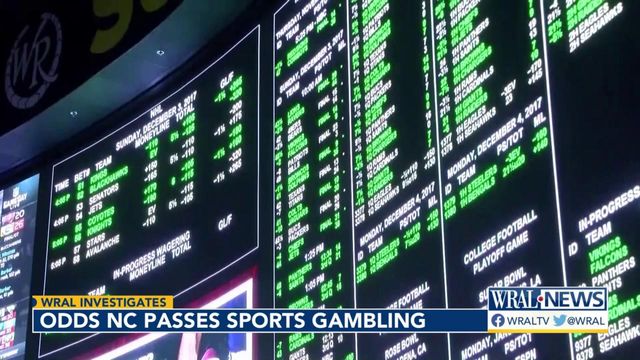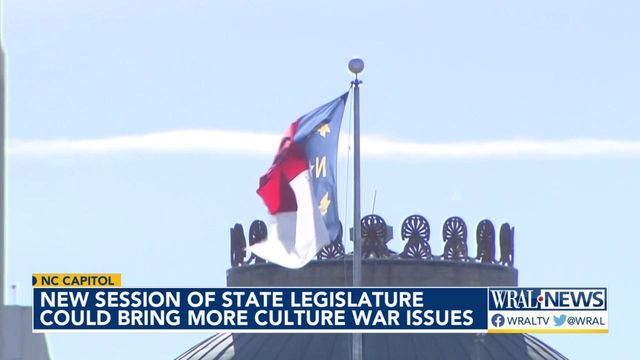NC teams, venues now want their own sports gambling licenses -- a change from previous legislation
State lawmakers are expected to consider more legislation to legalize online sports gambling in North Carolina. How the state allocates licenses could be one of the debates.
Posted — UpdatedSupporters of legalizing online sports gambling are confident they have the votes to pass a bill this session, just months after failing by a single vote on the House floor.
The teams want eight of 12 operator licenses available in the state to be allocated to them. Last year’s failed legislation outlined an application process for mobile gambling operators to secure 10 to 12 licenses.
“It gives us a better opportunity to maximize the revenue,” Carolina Hurricanes team president Don Waddell told WRAL. “We can’t get money from gambling. We’re going to get money from sponsorship and if we do a restaurant or something like that. So this gives us a better opportunity to capitalize on the amount of money that these people are going to make.”
“All the teams agree with it,” Waddell said.
Gambling operators would prefer more licenses be available through the competitive application process. The online sports gambling market is dominated by several brands. FanDuel, DraftKings, BetMGM and Caesars account for nearly 90% of market share in the states with legalization with FanDuel holding about half of that itself.
With fewer licenses available through the application process, smaller outfits could be left out or have no choice but to partner with a team, and any disagreements between supporters like operators and teams could complicate passage of the proposed legislation.
Many states that have legalized sports gambling have allocated or “tethered” licenses to in-state professional teams, racetracks or existing casinos.
“That sounds good because, of course, that benefits the hometown folks,” said Rep. Robert Reives, a Chatham County Democrat who voted against the legislation last year. “But again, I'd hesitate just because I really need to see language. One thing I've learned up here is a lot of things sound great until somebody writes it out.”
Legislature begins
Rep. Jason Saine, a Lincolnton Republican and top budget writer, said the state is seeking revenue leakage to states like Virginia and Tennessee since bettors can simply cross state lines to place a wager.
“I believe sports betting will get passed this session,” said Saine, who has been the face of the proposed legislation in the House.
But Saine and other supporters were confident last year, too.
Opponents from both parties outlined moral objections to expanding betting in the state, in some cases calling back to the state’s contentious votes to allow the lottery. Others cited previous cheating scandals in sports in their debates. The various changes, plus the two-bill format, left some confused about exactly what was happening.
“When we went into that vote, a lot of us didn't know what we were voting on, who we were benefiting,” said Reives, who is also the Democratic leader in the House. “And when you vote on something as serious as gambling, my position is I kind of need to know what the lay of the land is.”
Senate Bill 38 passed by a single vote on the House floor. The original bill, on which the entire legislation was predicated, fell by a single vote in the House, which had a number of absences and members who chose not to vote on the legislation.
Rep. Pricey Harrison, a Guilford Democrat who helped defeat the bill last year, wants expanded consumer protections and more oversight and protections for citizens. Harrison supported an amendment last year that would have prohibited customers from using a credit card to open an account. Instead, they’d have to use a debit card.
She said she isn’t opposed to any kind of gambling legislation, as some of her colleagues are. But she is worried about the ubiquitous nature of being able to place a wager at any time from anywhere.
Though sports betting is legal at three tribal casinos in North Carolina, Mobile sports gambling would allow bettors to place wagers on their phone or other electronic devices, making it much more accessible to the vast majority of residents.
“It would be great if there was some opportunity to come up with a bill that folks could live with,” said Harrison, who said she could support in-person betting at sports venues. “It may just be there are too many obstacles to getting to an agreement. I don’t like the concept of online sports betting on your phone.”
A new effort
Rep. Zack Hawkins, a Durham Democrat and a sponsor of the legislation, missed much of the short session due to a family matter. His vote likely would have tipped the scales in favor. But, perhaps more importantly, his absence denied supporters a strong voice with other lawmakers.
“It just goes to show one small thing changes — you don’t have the champion talking about it all the time — people start making different decisions and you literally lose by one vote,” Hawkins told WRAL. “When they called me, I couldn’t believe it. Could not believe it.”
Given that history and the precarious nature of a vote on gambling, some supporters are not eager to renegotiate major provisions of the bill, such as the teams’ plan for how the licenses are allocated.
“It’s a big deal,” said Sen. Jim Perry, a Lenoir Republican, who sponsored the legislation in the Senate. “I would not force that on the parties that have been working on this for three years, including team representation.”
In November 2019, North Carolina major professional teams, sports leagues, gambling operators and the Eastern Band of Cherokee reached an agreement to support online sports gambling in the state. In 2018, the U.S. Supreme Court struck down a 1992 federal law that banned sports gambling in all but a few states, most notably Nevada.
About half of the states allow mobile sports betting, including Tennessee, Virginia and Maryland, Maine and Massachusetts are in the process of launching mobile sports wagering.
Since the Supreme Court decision, states have adopted various ways of distributing licenses. Tennessee is the only state where all licenses are fully untethered to racetracks, tribes, retail casinos or, increasingly, sports teams. Arizona’s sports gambling bill allowed for 20 event wagering licenses with 10 reserved for in-state tribes and 10 reserved for owners of Arizona professional sports teams, NASCAR and the PGA Tour.
Massachusetts awarded four tethered licenses to physical casinos and can award up to seven untethered licenses in the state.
Ohio launched mobile betting on Jan. 1. The state’s legislation allows for Ohio casino, race tracks and pro sports franchises to apply for a license with NASCAR and the PGA Tour also being able to operate sportsbooks at their venues. Many Ohio franchises have already signed partnerships with gambling operators.
North Carolina’s teams want a similar set up. Lawmakers have not yet determined a path forward. Hawkins said he is certain the teams, operators and lawmakers can find common ground.
“I just assured everybody that everyone will be in the conversation,” Saine said. “Nobody has one way they’re going to get everything they want, I’m sure. We want to be responsive to all stakeholders and hear them out.”
He added: “ I’m not declaring anybody as the winner today.”
In early October, the Hurricanes, Panthers, Hornets, Charlotte Motor Speedway, the PGA Tour, Charlotte Football Club and NASCAR hosted a luncheon for state lawmakers at Raleigh’s PNC Arena. No sports wagering companies were included among the sponsors of the event which was billed as an “economic summit to discuss proposed development projects, sports wagering and the economic impact to North Carolina.”
Hurricanes head coach Rod Brind’Amour was a special guest during a lunch question-and-answer session. Lawmakers were also invited to skate on the ice and could purchase tickets at a special rate to the Hurricanes’ preseason game that night against the Columbus Blue Jackets.
About 20 lawmakers attended the event.
It’s just part of the outreach that the sports teams have done to lawmakers over the last two years. Waddell has met frequently with politicians on the issue, he said. The legislation called for sports lounges at certain venues across the state, including PNC Arena in Raleigh, Bank of America Stadium in Charlotte and Charlotte Motor Speedway in Concord.
“We've had months now to really have a chance to sit down, talk, see how this all fits into an overall economic development scheme,” said Reives, who did not commit to voting for the bill. “I definitely feel that I'm much more informed now than I was before.”
• Credits
Copyright 2024 by Capitol Broadcasting Company. All rights reserved. This material may not be published, broadcast, rewritten or redistributed.






